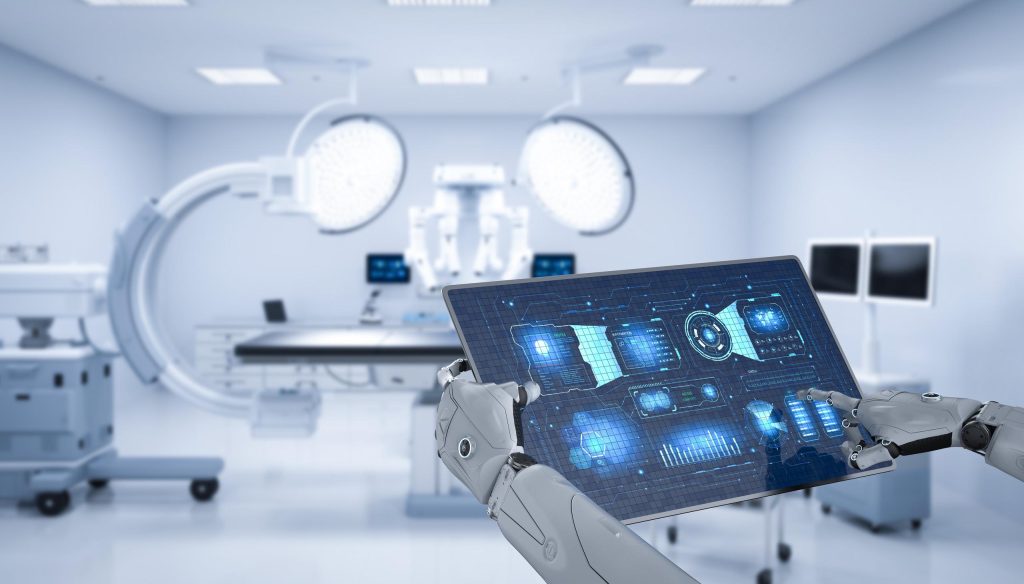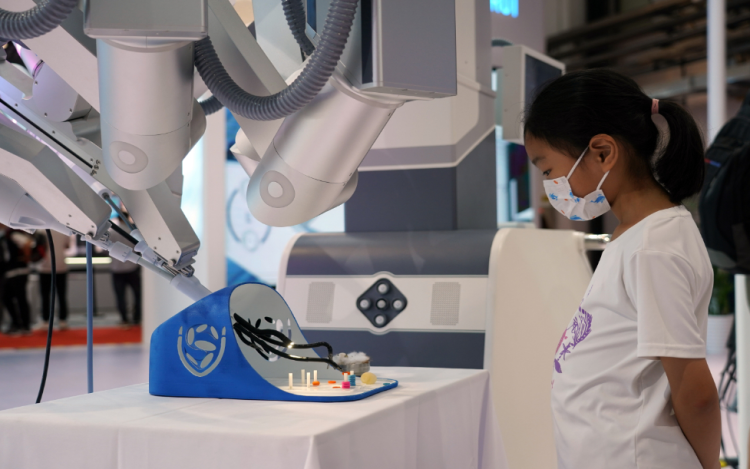Introduction
Artificial intelligence (AI) is transforming various sectors of the economy, and healthcare is no exception. As healthcare systems around the world face increasing challenges—ranging from rising costs and aging populations to the demand for more personalized treatments—AI technology promises to offer revolutionary solutions. With its ability to process vast amounts of data, recognize patterns, and make decisions quickly, AI is poised to enhance various aspects of healthcare, from diagnostics to treatment planning, administrative tasks, and patient care.
But will AI truly be the breakthrough tool that the healthcare sector needs? Can it help solve critical problems like improving the accuracy of diagnoses, reducing healthcare costs, or increasing access to care in underserved areas? Or will there be unforeseen challenges and ethical concerns that could hinder its widespread adoption? This article delves into the potential of AI technology in healthcare, its current applications, challenges, and the future outlook of AI as a transformative tool for improving healthcare systems worldwide.
1. Understanding AI in Healthcare
A. What is AI Technology?
Artificial intelligence refers to the simulation of human intelligence processes by machines, especially computer systems. These processes include learning, reasoning, problem-solving, perception, and language understanding. In healthcare, AI primarily focuses on using algorithms and machine learning models to analyze data, detect patterns, and assist in decision-making.
- Machine Learning (ML): A subset of AI where algorithms learn from data to make predictions or decisions without being explicitly programmed for every scenario. In healthcare, ML is often used for predictive analytics, such as forecasting disease outbreaks or predicting patient outcomes.
- Natural Language Processing (NLP): A branch of AI that allows machines to understand and process human language. In healthcare, NLP is used to extract meaningful information from unstructured data, such as doctors’ notes or research papers.
- Computer Vision: AI technologies that allow machines to “see” and interpret visual data. This is particularly useful in radiology, dermatology, and other specialties that rely on images to diagnose diseases.
B. Types of AI Used in Healthcare
- Diagnostic Tools: AI algorithms that help doctors detect diseases from medical images, genetic data, and patient histories.
- Robotic Surgery: AI-powered robots that assist in surgery by improving precision, reducing human error, and allowing for minimally invasive procedures.
- Virtual Health Assistants: AI-based systems that provide remote patient monitoring, answer health queries, and provide personalized care suggestions.
- Predictive Analytics: AI models that predict disease progression, patient readmission risks, or patient deterioration in real-time.
2. AI in Diagnostics: Enhancing Accuracy and Speed
A. AI’s Role in Early Diagnosis
One of the most promising applications of AI in healthcare is its ability to assist in early diagnosis. AI-powered diagnostic tools are already being used to detect diseases such as cancer, heart disease, and neurological conditions earlier than traditional methods. For example, machine learning models trained on thousands of medical images can identify signs of tumors, lesions, or fractures that might be missed by the human eye.
- Cancer Detection: AI models have demonstrated high accuracy in detecting various types of cancer, such as breast, lung, and skin cancer, by analyzing medical images like mammograms, CT scans, and skin biopsies.
- Cardiology: AI can analyze ECG data to predict cardiac events such as heart attacks, arrhythmias, and strokes, often detecting abnormalities that might be overlooked by clinicians.
B. Reducing Human Error and Improving Diagnostic Speed
Human error in medical diagnoses can have severe consequences, but AI offers a tool to reduce these errors by assisting doctors in making data-driven decisions. With the ability to analyze massive datasets and consider numerous variables at once, AI tools can provide a second opinion and ensure that no detail is overlooked.
- Speed: AI systems can process and analyze diagnostic data much faster than humans. This is particularly important in emergency situations, where quick decision-making can save lives.
- Accuracy: AI has the potential to outperform human specialists in certain areas, especially in pattern recognition tasks. This could reduce misdiagnoses and improve patient outcomes.
3. AI in Personalized Medicine: Tailoring Treatments to Individual Patients
A. Precision Medicine and AI
AI is already playing a key role in advancing precision medicine, which involves tailoring medical treatments to individual patients based on their genetic makeup, lifestyle, and environmental factors. By analyzing vast amounts of data, AI can help identify the most effective treatments for specific patient profiles, improving outcomes and reducing unnecessary treatments.
- Genomic Data Analysis: AI tools can analyze genomic data to identify genetic mutations associated with diseases, predict disease risks, and suggest personalized treatment plans.
- Drug Discovery and Development: AI is speeding up the drug discovery process by identifying promising compounds faster and predicting how different drugs will affect specific patients, potentially reducing the time and cost of developing new medications.
B. AI in Treatment Recommendations
AI systems can assist healthcare providers in choosing the best treatment options for their patients based on data such as medical history, test results, and treatment effectiveness. This helps ensure that each patient receives the most appropriate care, potentially reducing adverse effects and improving overall health outcomes.
- Clinical Decision Support: AI can assist clinicians by providing real-time recommendations during patient visits, helping them decide on diagnostic tests, prescriptions, and treatment strategies based on evidence from the latest research and patient data.

4. AI in Patient Care: Improving Accessibility and Efficiency
A. AI-powered Virtual Health Assistants
Virtual assistants powered by AI are becoming more common in healthcare settings. These systems can answer patient questions, schedule appointments, track symptoms, and offer medication reminders. They can also provide initial consultations, helping to triage patients and direct them to the appropriate care without needing a human operator.
- Telemedicine: AI-driven virtual health assistants can be integrated into telemedicine platforms, allowing patients to receive care remotely, reducing the need for in-person visits and improving access to healthcare in rural or underserved areas.
- Patient Monitoring: Wearable devices and AI-powered applications can continuously monitor patient health data, such as blood pressure, glucose levels, and heart rate, sending real-time alerts if abnormalities are detected. This proactive approach can help prevent emergencies and hospital readmissions.
B. Enhancing Efficiency in Healthcare Administration
AI can significantly reduce the administrative burden on healthcare professionals, freeing up time for patient care. Tasks such as scheduling, billing, data entry, and claims processing can be automated using AI, allowing healthcare workers to focus more on clinical duties.
- Electronic Health Records (EHR): AI can assist in organizing and managing patient records, extracting relevant information, and ensuring that records are up-to-date, reducing human error and improving data accuracy.
- Streamlining Workflow: AI systems can optimize hospital workflows, improving patient flow, minimizing wait times, and reducing staff burnout.
5. Challenges and Concerns in Implementing AI in Healthcare
A. Data Privacy and Security
One of the major concerns regarding AI in healthcare is the handling of sensitive patient data. Healthcare systems must ensure that AI systems comply with strict data privacy laws and that patient information is protected from breaches or misuse.
- HIPAA Compliance: In the U.S., AI tools must adhere to the Health Insurance Portability and Accountability Act (HIPAA) to ensure patient data is kept confidential and secure.
- Data Breaches: As AI relies on vast amounts of data, securing patient information against cyberattacks is critical to maintaining public trust in AI technologies.
B. Bias and Equity Issues
AI models are only as good as the data they are trained on. If AI systems are trained on biased or incomplete datasets, they may produce biased results, leading to disparities in healthcare outcomes. Ensuring that AI systems are trained on diverse and representative data is crucial to preventing discrimination in healthcare.
- Racial and Gender Bias: Studies have shown that some AI algorithms may be less accurate for certain racial or ethnic groups, potentially leading to unequal healthcare outcomes. Addressing these biases is essential to ensure AI promotes equity in healthcare.
C. Ethical and Regulatory Challenges
AI’s role in healthcare raises various ethical questions, such as who is responsible for decisions made by AI systems. In cases where AI makes a wrong diagnosis or recommendation, who should be held accountable—the AI system developer, the healthcare provider, or the healthcare institution?
- Regulation: Governments and regulatory bodies need to establish clear guidelines on the use of AI in healthcare, ensuring patient safety, quality of care, and transparency in AI-driven decisions.
6. The Future of AI in Healthcare: A Promising Horizon
A. Continued Innovation and Integration
As AI technology continues to evolve, its integration into healthcare will likely become more seamless, with AI systems working alongside human healthcare providers. The potential for AI to complement doctors, nurses, and other healthcare workers—rather than replace them—is immense. AI can serve as a powerful tool in improving diagnostic accuracy, personalizing treatment plans, and providing more efficient, accessible healthcare services.
B. The Need for Collaboration Between Technology and Healthcare Professionals
For AI to truly succeed in healthcare, collaboration between technologists, healthcare professionals, and policymakers will be essential. By ensuring that AI tools are designed with healthcare needs in mind and are regularly evaluated for effectiveness, we can maximize their benefits while minimizing risks.
Conclusion: Will AI Be the Breakthrough Tool for Healthcare?
AI technology holds enormous promise in revolutionizing healthcare. It can enhance diagnostic accuracy, provide personalized treatments, improve patient care, and make healthcare more efficient and accessible. However, challenges related to data privacy, bias, and regulation must be addressed to ensure that AI achieves its full potential in a way that benefits all patients and healthcare providers.
As AI continues to develop, it has the potential to be a transformative force in healthcare, improving outcomes, reducing costs, and helping to provide better care for more people around the world. With careful planning, collaboration, and regulation, AI can indeed become a breakthrough tool for improving healthcare, enhancing the quality of life for millions of people.









































Discussion about this post